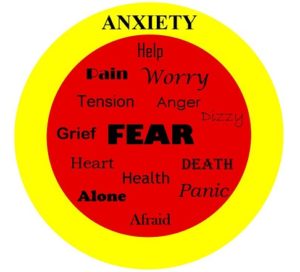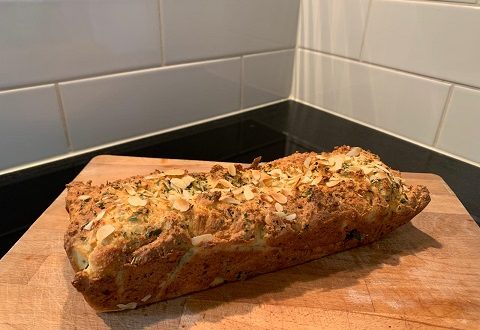Understanding anxiety
This post may contain affiliate links. Learn more.
Deze post kan affiliate links bevatten. Lees meer.

anxiety /aŋˈzʌɪəti/
noun: anxiety; plural noun: anxieties
1. a feeling of worry, nervousness, or unease about something with an uncertain outcome. “he felt a surge of anxiety”
Anxiety
It begins. Again. Your heart starts to race, you feel it beating hard in your chest. Your hands become clammy, your breathing becomes fast and shallow. Sweat breaks out from every pore in your body. Suddenly you feel hot and cold.
Your body feels strange, something is definitely off. You feel pressure on your chest. You begin to feel dizzy. Your brain is starting to catch up. This is the end. It must be a heart attack. You are dying.
In milliseconds, hundreds of scenarios pass through your mind. You map out exactly where the nearest hospital is and frantically start scanning your phone for known contacts. You monitor your heartbeat through one of the many apps you installed, and it always seems too high. Fear starts to tighten your throat and forms a knot in your stomach. You feel desperate. If you are alone, you imagine yourself lying alone on the floor, dying. If you are around others, you try to hide what you feel but you want them to know at the same time. Because maybe this time, your fears become reality.
On some days, you go to the emergency, by the time you are there, you feel different. Calmer. But still quite sure you were near the edge of death. Doctors will explain you many things, none of which you really believe. After all, you were so sure. However, most of the times, you know deep down inside, however real your impeding death may seem, that your attack was something else entirely.
Hello anxiety, my old friend….
What is an anxiety attack?
An anxiety attack has many names and can come in many shapes, but by the time we have reached our adult life, most of us have experienced it one way or the other. It is an attack that causes severe panic in your mind and causes your body to react to your mental state as if you are in a life or death situation. It estimated that in the US alone, it affects 40 million adults age 18 and older, or 18.1% of the population every year. Anxiety disorders are highly treatable, yet only 36.9% of those suffering receive treatment.
Why does anxiety often go untreated?
Unfortunately, because it is an illness so much related to your mental state, many people experience it as a ‘weakness’ experienced during a difficult time in their lives, and something that will go away on its own when they ‘feel better’. The problem with anxiety attacks is that by the time you reach the hospital, or are otherwise calmed down, the after effects are very little, apart from feeling very tired. This is because your body mimicked a reaction and once it is satisfied there is no impeding death to be dealt with, it calms down.
Because there are little or no after effects to an anxiety attack, we do not seek treatment. For example, if you had a broken knee, the hospital will fix it, but you will still need weeks of physiotherapy. Then when you can walk again without problems, you know the issue is fixed. For many of us, mental health is still a topic that has a certain stigma. It is ‘bad’ if you have a problem with your mental health. However, just as much as a broken knee from a fall is not your fault, anxiety attacks because of poor mental health is also not your fault. And just as much as a broken knee needs care and aftercare, anxiety needs the same.
Since our body follows the direction of our mind, as we can clearly see in the case of anxiety, it is even more important so to take good care of it.
Triggers
Because anxiety has little or no immediate after effects, we think that we are okay once the attack has passed. Even though the attack may repeat itself, it usually takes a very long time before we can recognize that anxiety is a problem for us. For one of many reasons, anxiety is very hard to deal with because we do not take the time to stop and really think about what triggered the attack. It will stay dormant in the background of our consciousness, waiting to rear its ugly head again whenever triggered.
Anxiety attacks can be triggered by any variety of thoughts, emotions, situations, outside influences, sounds, feelings; the list is endless. We cannot avoid these triggers and should be very mindful of not doing so. If we would avoid triggers, for example, we would end up not going outside anymore because a busy supermarket with bright lights triggered us the last time we went out. However difficult it may seem, avoidance of triggers is not the solution.
Anxiety and alcohol
Alcohol is a drug that sometimes relaxes, and at other times acts as an accelerant. It’s role in anxiety is also exactly that. When you feel anxious and you drink alcohol, it may suppress the fight or flight reaction of your brain and subsequently relaxes your body. Therefore, we may start to drink more whenever we feel anxious, therefore bypassing the effects of anxiety, but not its cause. Since most of us cannot drink indefinitely, there will undoubtedly come a moment when the anxiety comes up without a glass of alcohol at hand, and often, a thousand times more intense because it was suppressed. Because the use of alcohol to soothe anxiety gives us a false sense of safety, it is very dangerous. Be mindful that you can only solve matters of the mind by being completely present, however hard it may seem.
Other negative effects of alcohol in combination with anxiety are the after effects. Especially when we get older, a few drinks at night can already cause us to feel groggy and slow the next day. Alcohol also makes your blood sugar go up, usually combined with an increased heart rate and shallower breathing. We may feel dizzy the day after we drank too much because our blood pressure is lower. Recognize this? Indeed, these are generally the same symptoms as the start of a panic attack. Hangovers often trigger panic attacks. It is a vicious cycle and very dangerous for your mental wellbeing. If you want to deal with your anxiety, alcohol will not help, period.
How to deal with anxiety?
First of all, know that anxiety is not a weakness. It is a process that is triggered in your mind, outside of your control. It is not your fault, it is not a bad thing. It is an illness. And it needs to be treated. If you experience severe anxiety, always see a specialist. The remedies listed below are not related to medication or doctors, they are easy steps you can follow to recognize and deal with your anxiety. However, if you feel that anxiety controls your every day life, always seek medical care.
These are six things that you can do to calm down your mind and that may help you going through your anxiety attack. They really do help:
1. Find a safe space
When you experience anxiety, try to find a safe space or a space where you can allow yourself to relax. At home, this may be your bedroom. However, even when you are in a busy or formal environment, in a mall or at the office, you can go to the toilet and take a few minutes to feel safe in your space.
2. Do a simple breathing exercise
Try to do a simple breathing exercise, this may seem impossible at the moment, with all the emotions and feelings roaring inside of you, but it really does help. Simply follow your breath ten times and count your inbreath and outbreath.
One: in –out. Two: in – out. Three: in – out. Etc. Do not try to control or deepen your breathing, it will cause even more panic. Just follow your breathing with your attention. Repeat when you are at ten. Try to do at least three sessions of 10 breaths.
3. Contact someone you love and knows about your anxiety attacks
By talking to someone who knows about our situation, we can feel immediately relieved and at ease. Also, talking will regulate our breathing. It also calms our mind because our focus will gently shift from the fight or flight response that is triggered in our bodies towards talking to someone on the phone. Your body will slowly calm down and the sensations that were triggered will calm down with it. If you have not told anyone about your anxiety, try to find one person that you can talk to and whom you can call when it happens. It really helps.
4. Recognize your triggers
Recognizing your triggers can go a long way in helping yourself deal with anxiety. When you encounter your triggers, the fear will take possession of you, triggering your bodily reaction to anxiety, because we want to fight our fears. Try not to fight the fear, let it pass through you and take possession of you. Your body will not follow this time, because the mind will have the time to recognize the fear for what it is, and its irrational cause, before kickstarting the chain of reactions in your body.
Giving your mind time and space to process the triggers is vital to dealing with anxiety. It will be super scary because you associated it for a long time with impeding death, but it will pass. And if you can manage to calm your reaction to your triggers time and time again, your anxiety will decrease.
5. Meditation
Meditation is a century old tradition that helps us to explore our mind. It also calms us down and sheds light on our habit patterns. Likewise, meditation can effectively help you to calm your mind when you experience an anxiety attack. Meditation is a tool to help you focus your mind by understanding it and by exploring the space that you have within your mind. It slows your reaction speed to habitual patterns, such as the response to triggers to anxiety attacks. There are many amazing guided meditation sessions that are specifically aimed at dealing with anxiety.
One of the great Zen masters of all times, Thich Nhat Han, also wrote books about meditation and mindfulness in combination with anxiety. Even though it may seem hard to meditate whilst feeling anxious, it is not at all hard. See our other post about easy ways to meditate.
6. Do not try to control or push away your fear
The biggest and most difficult part of the anxiety attack is the irrational fear that arises in us, and that fear can take many forms. It may reveal itself as fear of death, of illness, of losing a child, but it can also remain hidden in the attack itself, leaving you puzzled as to what exactly was going on. Trust me, fear is always present and the main drive behind every panic attack, however deep hidden it may be.
If you try to push away this fear whilst you are having an attack, it will only bury itself deeper. Your physical symptoms may calm down as the attack subsides, but the fear will remain in your unconsciousness. Let it out. Do not try to control it or push it away, let it possess you. Letting it be present and course through you, is the only way to let your mind tell your body that the fear will not kill you. Thus, the next time, your body will not trigger the same fight or flight response to your mental fear. Your anxiety will subside. Trust yourself that you are strong enough.
Will my anxiety ever go away?
These are just a few things that you can do when an anxiety attack happens or when you feel that one is coming up. The most important thing to remember throughout all of it is that you can trust yourself and that deep down inside, you know it is just an attack and it will pass.
Throughout our lives, anxiety will always be present. It is however our choice whether we will let it control our lives, or whether we will seek treatment or find ways to deal with it in a healthy mindful way. We can learn to live with it as long as we can recognize it and trust ourselves in doing so.
Next time you feel an attack coming up, greet it by saying hello anxiety, my old friend. Hello fear, my old friend. By allowing it to be present, your mind will not overreact to the fear and neither will your body.
Always remember, mental health matters!
Do you want to learn how to meditate? See our post on meditation for beginners. In a few easy steps you can start meditating now!
Amazon and the Amazon logo are trademarks of Amazon.com, Inc. or its affiliates.
Bol.com en het Bol.com logo zijn handelsmerken van Bol.com of haar affiliates.


You May Also Like

How To Make Delicious Olive & Rosemary Keto Bread?
16 September 2020
Keto Chicken Nuggets, the perfect Keto Snack
30 July 2021